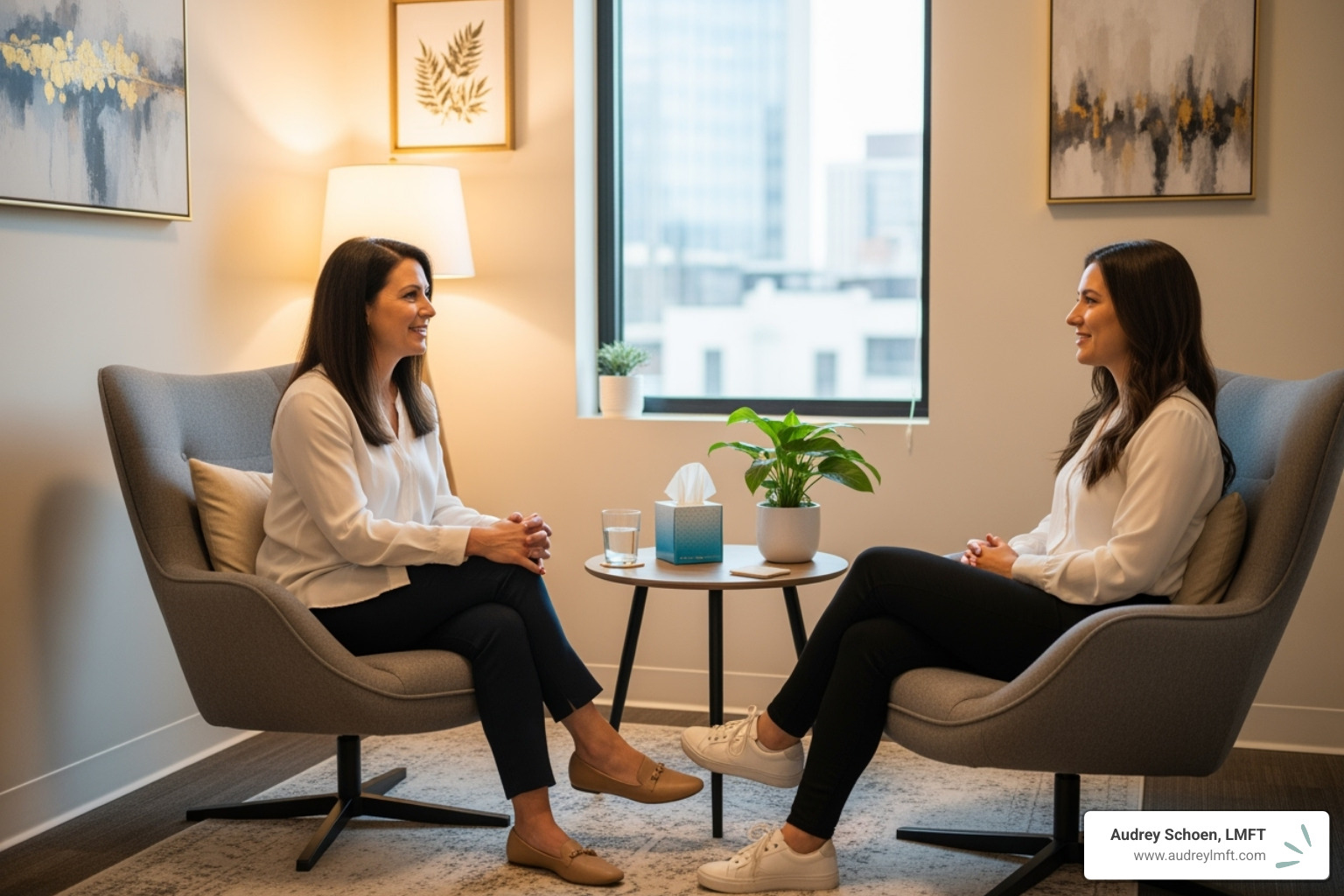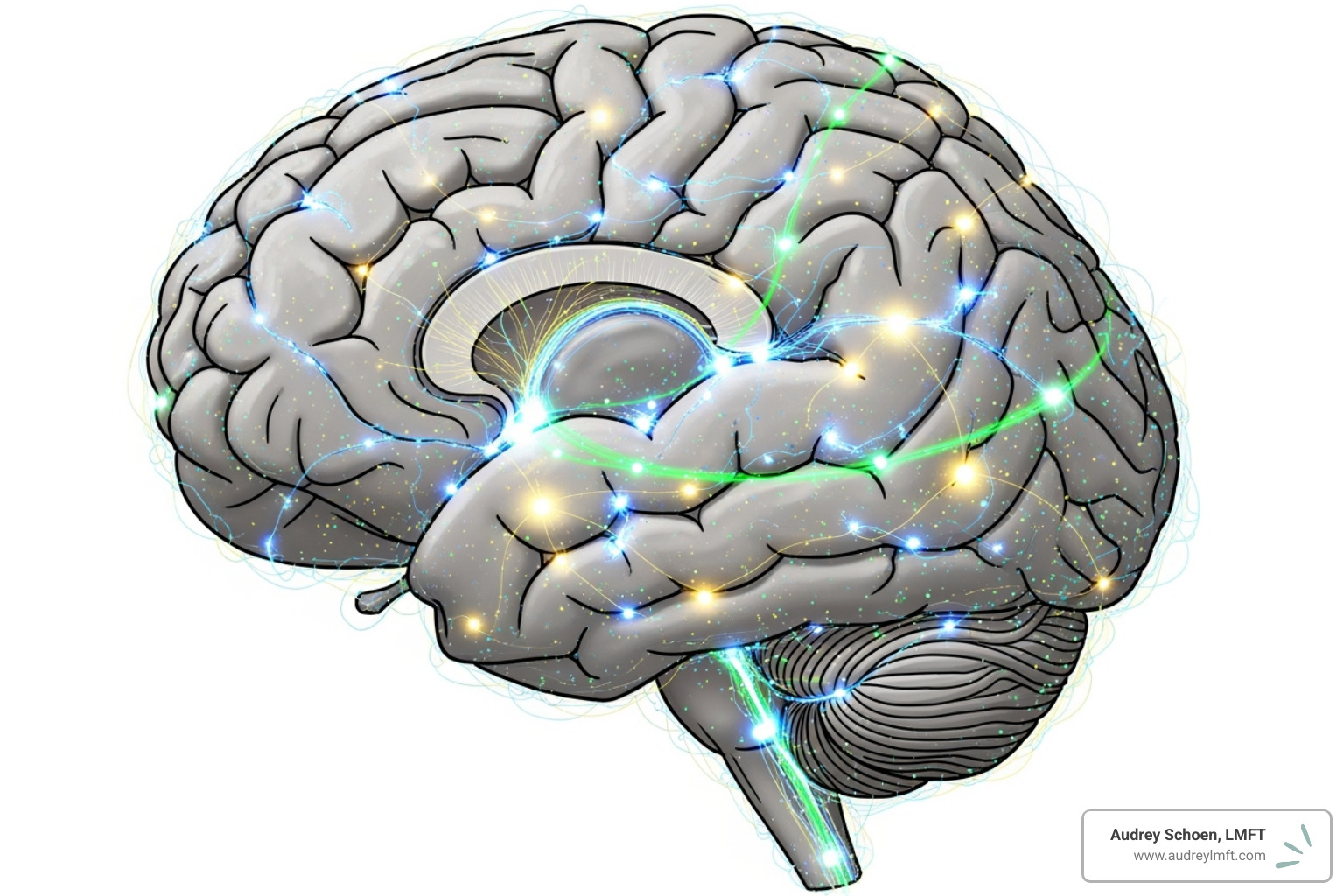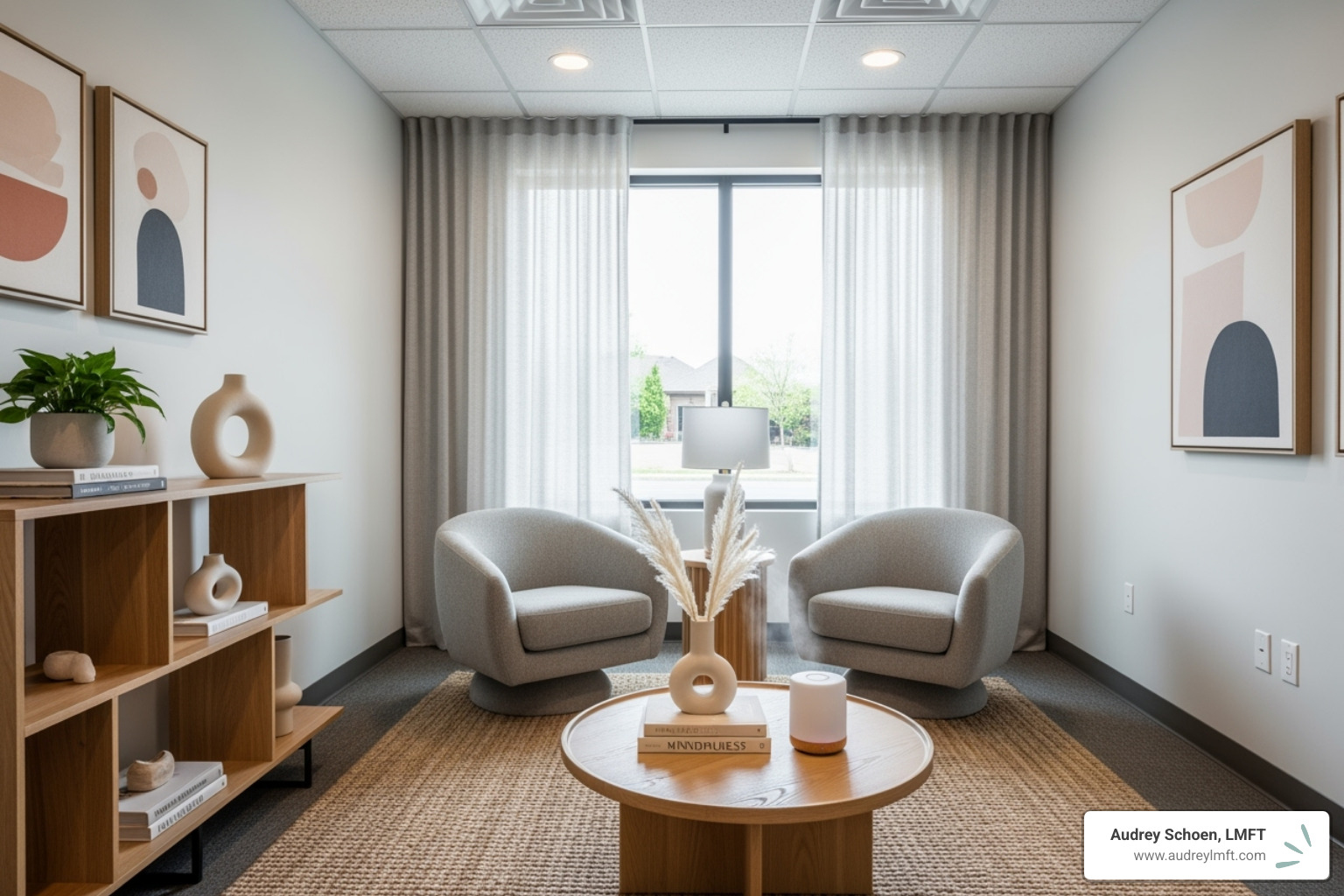Anxiety Therapy Roseville: Expert Care for Overachievers and Perfectionists

Anxiety treatment doesn't have to be a long, uncertain journey. If you're an anxious overachiever struggling with perfectionism, people-pleasing, or the constant internal chaos of racing thoughts, specialized anxiety therapy Roseville residents trust can provide the relief you've been seeking. As Audrey Schoen, LMFT, I understand the unique mental health challenges faced by high-achieving adults who appear successful on the outside while battling overwhelming worry and self-doubt internally.
My practice in Roseville, CA combines cutting-edge therapeutic approaches like Accelerated Resolution Therapy (ART) and Brainspotting with evidence-based anxiety treatment methods to help you achieve rapid, lasting recovery from anxiety disorders. Whether you're dealing with imposter syndrome, relationship struggles that leave you feeling overwhelmed, or the exhausting cycle of perfectionism, my specialized approach addresses both the symptoms and the underlying causes of your anxiety.
Located in Roseville, California, I offer both in-person sessions and online therapy throughout California and Texas. My focus is on helping anxious adults, couples, entrepreneurs, and Law Enforcement Officer spouses find hope and healing through personalized, intensive therapeutic work that creates meaningful change quickly. Through targeted anxiety treatment, clients gain tools to manage their mental health challenges and develop lasting recovery strategies.
Understanding Anxiety: More Than Just Worry
Anxiety disorders affect millions of people, yet many struggling with these mental health conditions suffer in silence, unsure where to turn for effective help. For high-achieving adults, anxiety often manifests differently than what you might expect. You might appear successful and competent to others while internally battling constant self-criticism, perfectionism, and the fear of not being "enough."
The Hidden Face of High-Functioning Anxiety
Many of my clients come to anxiety therapy after trying self-help approaches and sometimes even previous counseling experiences. They're typically intelligent, accomplished individuals who like to learn ways to understand their challenges intellectually. However, they often find themselves disconnected from their emotions, even while feeling overwhelmed by emotional reactivity and anxious thoughts.
Common experiences in daily life include:
Perfectionism and Self-Criticism: The relentless drive to be perfect, coupled with harsh internal criticism when you fall short of impossible standards. This constant worry affects self-esteem and creates ongoing emotional pain.
People-Pleasing Patterns: Difficulty setting boundaries and saying no, leading to resentment and exhaustion from constantly putting others' needs first while struggling with fear of disappointment.
Imposter Syndrome: Despite your achievements, you feel like a fraud who will eventually be "found out," creating constant anxiety about performance and competence.
Relationship Struggles: Communication breakdowns with partners, friends, or colleagues that stem from internal narratives and unconscious patterns rather than actual communication skills.
Emotional Disconnection: Feeling overrun by emotions while simultaneously being disconnected from them, often busying yourself to avoid dealing with difficult feelings and unresolved trauma.
Physical Symptoms: Racing heart, muscle tension, digestive issues, sleep problems, and other physical manifestations of chronic stress and anxiety that impact daily life.
The Cost of Untreated Anxiety Disorders
When anxiety disorders go unaddressed, they don't just affect your mental health—they impact every aspect of your life. Relationship struggles intensify as communication patterns become strained. Career advancement may stall despite your capabilities. Physical health deteriorates under constant stress. Most importantly, you miss out on the deep sense of calm and connection you're seeking, and the meaningful life you deserve.
The good news is that anxiety treatment is highly effective when you work with a therapist who understands your specific mental health challenges and has the specialized training to address them effectively. Research shows that with proper treatment, individuals can achieve lasting recovery and learn new skills for managing anxiety.
My Specialized Approach to Anxiety Treatment in Roseville, CA
As a Licensed Marriage and Family Therapist with advanced training in brain-based therapeutic approaches, I offer a comprehensive anxiety treatment model that addresses anxiety disorders from multiple angles. My counseling approach is active, engaged, and directive while maintaining the reflective space you need to process and heal.
Comprehensive Assessment and Treatment Planning
Your anxiety treatment journey begins with a thorough intake process that includes detailed questionnaires and measures to help us gauge your current symptoms and track progress throughout our work together. During our first session, I focus on getting to know you, your background, the contributing factors to your anxiety, and collaboratively setting goals for our counseling work.
I take a holistic view that considers you as a whole person within the systems you exist in—family, work, culture, and relationships. This comprehensive perspective allows us to create a treatment plan that addresses not just your symptoms but the underlying patterns and triggers that maintain your anxiety. This approach helps patients gain tools for managing their mental health challenges effectively.
Evidence-Based Treatment Modalities
My practice integrates several specialized approaches, each chosen for its effectiveness in treating anxiety disorders and related challenges:
Accelerated Resolution Therapy
As a Certified Master ART Practitioner, I've witnessed the remarkable power of this anxiety treatment approach to create rapid relief from anxiety, trauma, and emotional distress. ART works differently from traditional behavioral therapy by directly addressing the distressing images and sensations stored in your brain.
Using guided imagery and specific eye movements, ART helps your brain "re-file" upsetting memories and experiences, so they lose their emotional charge. This process often creates significant relief in just a few sessions, breaking the cycle of feeling stuck and hopeless that many anxious individuals experience.
For clients dealing with specific phobias or single-incident trauma, I often incorporate ART right away for targeted, efficient results. The rapid progress typically motivates clients as they experience positive benefits immediately, helping them find clarity and hope for lasting recovery.
Brainspotting for Deep Healing
As a certified Brainspotting therapist, I utilize this powerful brain-based anxiety treatment approach to help process and release deep-seated trauma and anxiety. Brainspotting operates on the principle that "where you look affects how you feel."
During Brainspotting sessions, we identify specific eye positions that correlate with stored emotional and physical experiences. Accessing these "brainspots" allows your brain to process unresolved trauma and bodily tension at a subcortical level, bridging the gap between what you know intellectually and what you feel emotionally.
This approach is particularly effective for clients who feel stuck or have difficulty accessing emotions through traditional talk therapy. Many patients report feeling more grounded and experiencing fewer physical symptoms after Brainspotting sessions, gaining new skills for managing anxiety and finding greater emotional healing.
Relational Life Therapy (RLT) for Relationship Challenges
Many anxious individuals struggle with relationship patterns that create ongoing stress and disconnection. Relational Life Therapy addresses the internal narratives and automatic unconscious processes that interfere with healthy communication and intimacy.
RLT works in three distinct phases:
Phase 1: Assessment and Pattern Recognition During this initial phase, I gather comprehensive data about your relationship patterns, identifying the specific "dance" that keeps you stuck in conflict and disconnection. We examine each partner's contributions to escalation, establish clear goals for success, and implement preliminary coping skills like appropriate boundaries and de-escalation techniques.
I also amplify both the negative consequences of continuing current patterns and the positive outcomes possible when change occurs. This helps create buy-in and commitment, particularly important when working with resistant partners who may be struggling with their own anxiety or depression.
Phase 2: Trauma and Historical Work This phase addresses the past experiences and triggers that prevent change even when you want it. We explore how your adaptive responses to childhood experiences and life events worked well in the past but are now creating problems in your current relationships.
I make direct connections between your family-of-origin experiences and current relationship conflict patterns. This isn't exploration for the sake of understanding—it's targeted treatment designed to change current patterns. When trauma work is needed, it's direct and concentrated, always connected to present-day change and emotional healing.
Phase 3: Skills Development and Implementation Building on the understanding gained in Phase 2, we teach concrete skills for healthier communication and connection. When roadblocks arise in using these new skills, we directly address the barriers so you can be successful in implementing lasting change and managing anxiety within your relationships.

Behavioral Therapy Techniques and Coping Skills
In addition to specialized approaches, I incorporate behavioral therapy techniques that help you develop practical coping skills for managing anxiety in daily life. These evidence-based methods help you learn ways to:
- Interrupt anxious thought patterns before they escalate
- Develop grounding techniques for moments of overwhelming fear
- Build tolerance for uncomfortable emotions and physical sensations
- Create structured approaches to face anxiety-provoking situations
- Establish healthy routines that support mental health
While some therapists might use exposure therapy for specific phobias, I often find that ART provides faster, more comfortable results for addressing fears and trauma responses. The goal is always to help you reduce symptoms while building confidence in your ability to handle life's challenges.
Specialized Tools: The Feedback Wheel
One of the unique communication tools I teach is the feedback wheel, which provides a structured pathway for one partner to communicate problems and offer their partner a clear way to repair. This approach is specifically designed to avoid the typical dialogue format that often leads to escalation and increased anxiety.
The feedback wheel allows one partner to:
- Describe what they observed
- Share what they made up about what happened
- Express how they feel about their interpretation
- Request specific repair actions
The listening partner focuses on understanding and offering repair rather than defending or sharing their own perspective. This structure prevents the communication breakdowns that fuel relationship anxiety and conflict, helping couples find clarity and connection.
Specialized Services for Unique Populations
Therapy for Entrepreneurs
Entrepreneurs face unique mental health challenges that can fuel anxiety and burnout. The constant uncertainty, financial pressures, and responsibility for others' livelihoods create specific stressors that require specialized understanding and treatment.
I help entrepreneur clients manage:
- Performance anxiety and fear of failure
- Decision-making paralysis and worry about outcomes
- Work-life balance challenges that affect mental health
- Imposter syndrome in leadership roles
- Relationship struggles caused by business pressures
- Financial anxiety and money-related stress
Through targeted counseling, entrepreneurs gain tools to treat anxiety while maintaining their professional effectiveness and finding hope for sustainable success.
Support for Law Enforcement Officer (LEO) Spouses
LEO spouses face distinct stressors and anxiety patterns that require specialized support. The unique mental health challenges of being married to someone in law enforcement—including safety concerns, shift work, and the emotional demands of the job—create specific relationship dynamics and individual stress patterns.
My counseling work with LEO spouses addresses:
- Anxiety related to officer safety and job demands
- Communication challenges around work stress and trauma
- Managing the emotional toll of law enforcement culture
- Building resilience and coping skills for ongoing stress
- Strengthening the marital relationship despite job pressures
Financial Therapy
Money anxiety and financial avoidance are common issues that often fuel broader anxiety disorders. Whether you're dealing with debt, financial decision-making paralysis, or money-related relationship struggles, financial therapy addresses both the practical and emotional aspects of money management.
Financial therapy helps struggling individuals with:
- Overcoming money avoidance behaviors that increase anxiety
- Reducing financial decision-making anxiety and worry
- Improving communication about money in relationships
- Addressing underlying beliefs and emotions about money
- Creating sustainable financial behaviors and goals
This specialized treatment approach helps clients find clarity around money issues while reducing the anxiety that often accompanies financial stress.

Couples Counseling: Healing Relationship Patterns
Many anxious adults find that their symptoms significantly impact their intimate relationships. Couples often come to therapy believing they have communication problems, but the real issue usually lies deeper—in the internal narratives and unconscious patterns that create defensive reactions and emotional distance.
My Approach to Couples Work in Roseville, CA
For couples seeking anxiety treatment and relationship healing, I recommend 80-minute sessions, typically scheduled every two weeks to allow time for practicing new skills between sessions. I ask for an initial three-month commitment to give us adequate time to make meaningful progress and determine if we're on the right track.
The extended session length allows us to:
- Move through conflict without rushing the process
- Practice new communication skills thoroughly
- Address underlying emotional triggers and unresolved trauma
- Create lasting behavioral changes that reduce anxiety
- Build deeper intimacy and connection
Addressing Communication Breakdowns
Most couples I work with aren't actually having communication problems—they're having disconnection problems. The real issue often stems from each partner's automatic reactions based on past experiences and internal fears that fuel ongoing anxiety and relationship struggles.
Through RLT counseling, we identify these patterns and provide tools for breaking free from reactive cycles. The goal isn't just better communication—it's deeper emotional safety and genuine intimacy that allows both partners to feel anxious less often and experience greater emotional healing.
When depression co-occurs with anxiety in relationships, we address both conditions as part of comprehensive treatment, helping couples understand how mental health challenges impact their connection and learn ways to support each other's healing.
Intensives and Retreats for Accelerated Healing
For clients seeking concentrated, accelerated progress in their anxiety treatment, I offer intensive sessions and retreat experiences. These extended formats allow for deeper work and faster progress than traditional weekly counseling sessions.
Individual Intensives
Intensive sessions are particularly effective for:
- Processing specific traumas or phobias that fuel anxiety
- Breaking through therapeutic plateaus in treatment
- Addressing complex anxiety patterns and disorders
- Preparing for major life transitions
- Accelerating progress in ongoing therapy
These concentrated treatment experiences help clients achieve lasting recovery more quickly while developing strong coping skills for managing anxiety long-term.
Couples Retreats
Couples retreats provide an immersive experience for partners ready to make significant changes in their relationship. These intensive counseling experiences combine the structured approach of RLT with the concentrated time needed for meaningful transformation and healing.
Retreat experiences typically include:
- Comprehensive assessment of relationship patterns and anxiety triggers
- Intensive trauma and historical work that addresses unresolved pain
- Skills training and practice for managing anxiety within relationships
- Creating sustainable change plans for ongoing growth
- Building maintenance strategies for lasting recovery
What to Expect: Your Therapy Journey
Initial Assessment Phase
Your anxiety treatment journey begins with a comprehensive intake that includes detailed questionnaires designed to assess your current symptoms and establish baseline measures for tracking progress. Our first session focuses on understanding your unique experience, background, and goals for counseling.
I may recommend collateral support to enhance our work together, such as:
- Medical evaluation for physical symptoms of anxiety
- Psychiatric consultation if medication might be helpful for your anxiety disorders
- Couples work if relationship struggles are significant
- Intensive sessions for accelerated progress and healing
Active Treatment Phase
Anxiety treatment is customized to your specific needs and preferences. We might meet weekly for standard sessions or opt for longer sessions every other week, depending on what works best for your schedule and therapeutic goals.
Early in treatment, I often incorporate ART and Brainspotting sessions, which typically create a boost of quick progress that's highly motivating for clients. This rapid relief helps break the cycle of feeling stuck and hopeless, offering hope for lasting recovery.
My therapeutic style is actively engaged and direct. You can expect a therapist who is present, involved, and willing to challenge patterns that aren't serving you while maintaining a supportive, nonjudgmental environment where you can process emotions and gain new skills.
Progress Monitoring and Adjustment
At approximately 3-6 months, we reassess the measures from your intake to determine progress and identify areas where treatment is still needed. We update goals regularly to ensure we stay on track together and continue making meaningful progress in managing anxiety.
This collaborative approach ensures that counseling remains focused on your priorities and that we're making meaningful progress toward your goals for lasting recovery and improved mental health.
Treatment Outcomes and Effectiveness
Anxiety treatment is highly effective when delivered by qualified therapists using evidence-based approaches. Research consistently shows that patients can achieve significant improvement in anxiety symptoms through specialized therapy and counseling.
What Success Looks Like
Lasting recovery from anxiety disorders doesn't mean never feeling anxious again—it means developing the tools and resilience to manage anxiety when it arises without it controlling your life. Successful treatment typically results in:
Emotional Regulation: Greater ability to manage intense emotions and anxious thoughts without becoming overwhelmed or disconnected.
Improved Relationships: More authentic communication, healthier boundaries, and deeper connections with others, reducing relationship struggles.
Reduced Physical Symptoms: Decreased muscle tension, better sleep, improved digestive health, and overall physical well-being.
Increased Confidence: Reduced self-criticism and imposter syndrome, with greater self-esteem and realistic self-assessment.
Better Decision-Making: Clearer thinking without the fog of chronic anxiety and worry, leading to more confident choices.
Enhanced Life Satisfaction: Greater ability to enjoy a meaningful life, pursue goals, and maintain work-life balance while managing anxiety effectively.
Timeline for Improvement
Many clients notice initial relief within the first few sessions, especially when using approaches like ART or Brainspotting. This early progress is often motivating and helps build confidence in the therapeutic process and hope for continued healing.
While symptom relief can happen quickly, deeper pattern changes around perfectionism, people-pleasing, and relationship dynamics typically take longer to solidify. The duration of treatment depends on factors such as:
- Complexity and severity of anxiety symptoms and disorders
- Presence of trauma, depression, or other complicating mental health conditions
- Consistency of session attendance and engagement in the process
- Active participation in therapeutic homework and skill practice
- Support system and life circumstances
Most clients see significant improvement within 3-6 months of consistent therapy, though some may benefit from longer-term work to address complex trauma or relationship patterns. The goal is always lasting recovery and the development of strong coping skills for managing anxiety throughout life.

Supporting Your Therapy with Lifestyle Changes
While therapy provides the foundation for anxiety treatment, certain lifestyle modifications can significantly enhance your progress and long-term success in managing anxiety disorders.
Mindfulness and Grounding Practices
Developing mindfulness skills helps anchor you in the present moment rather than getting caught up in anxious thoughts about the future or worry about past events. Regular practice of meditation, deep breathing, or other grounding techniques can:
- Reduce the intensity of anxiety symptoms and fear responses
- Improve emotional regulation and self-esteem
- Enhance self-awareness and connection to your emotions
- Strengthen your ability to pause before reacting to stress
Physical Health Foundations
Your physical health significantly impacts your mental health and anxiety levels. Important areas to address include:
Sleep Hygiene: Consistent, quality sleep is fundamental for managing anxiety. Poor sleep often worsens anxiety symptoms and makes it harder to use coping skills effectively.
Nutrition: Regular, balanced meals help stabilize blood sugar and mood. Certain foods and substances can worsen anxiety, while others support nervous system regulation and healing.
Exercise: Regular physical activity is one of the most effective natural ways to treat anxiety. Movement helps metabolize stress hormones and releases mood-boosting endorphins.
Limit Stimulants: Caffeine and other stimulants can worsen anxiety symptoms, particularly for sensitive individuals struggling with anxiety disorders.
Building Support Systems
Isolation often worsens anxiety, while connection and support enhance recovery. Building and maintaining supportive relationships involves:
- Identifying trusted friends or family members who understand your mental health journey
- Setting appropriate boundaries with people who increase your anxiety
- Engaging in meaningful community or social activities
- Considering support groups for specific challenges like grief, anxiety, or relationship issues
Accessing Care: Practical Information
Session Formats and Scheduling
I offer both in-person sessions at my Roseville, California location and online therapy throughout California and Texas. This flexibility allows you to choose the format that best meets your needs and circumstances for anxiety treatment.
Online therapy is particularly beneficial for:
- Clients with busy schedules or travel demands
- Those who feel more comfortable in their own space when processing emotions
- Individuals in areas without specialized anxiety therapists
- Anyone seeking consistency when travel or relocation occurs
Investment in Your Mental Health
Quality mental health care is an investment in your overall well-being and ability to live a meaningful life. While I don't accept insurance directly, I can provide detailed statements for you to submit to your insurance company for potential out-of-network benefits.
Many clients find that the concentrated, specialized nature of my approach actually provides better value than traditional therapy models because progress often happens more quickly and with longer-lasting results. The focused anxiety treatment approach helps clients achieve lasting recovery more efficiently.
I encourage you to contact your insurance provider to understand your out-of-network benefits before beginning treatment. Many plans provide partial reimbursement for out-of-network mental health services and counseling.
For information about session fees and scheduling, please reach out directly. I'm happy to discuss the financial aspects of treatment and help you understand your options for accessing quality anxiety therapy in Roseville, CA.
Taking the First Step
If you're tired of feeling controlled by anxiety, perfectionism, or relationship struggles, you don't have to continue struggling alone. Specialized anxiety treatment can provide the relief and tools you need to create lasting change and find hope for a better future.
The first step is often the hardest, but it's also the most important. Reaching out for help takes courage, especially for high-achieving adults who are used to handling everything on their own and may struggle with asking for support.
What Happens Next
When you contact my office, we'll schedule a brief consultation to determine if my approach is a good fit for your needs. During this conversation, we can discuss:
- Your specific concerns and goals for anxiety treatment
- The therapeutic approaches that might be most helpful for your anxiety disorders
- Session format preferences (in-person vs. online)
- Scheduling and logistics for counseling in Roseville, CA
- Any questions you have about the therapy process and what to expect
Ready to Begin Your Healing Journey?
You deserve to feel calm, confident, and connected. Recovery from anxiety disorders is not only possible—it's probable with the right support and approach. My specialized training and experience with anxious overachievers, perfectionists, and couples provides the expertise you need to create meaningful, lasting change and find clarity in your life.
Whether you're dealing with individual anxiety, relationship challenges, or the unique pressures of entrepreneurship or law enforcement life, I'm here to provide the specialized counseling and support you need to treat your anxiety effectively.
Contact my office today to begin your journey toward a calmer, more confident life. You've already taken the hardest step by recognizing that change is needed—now let me help you create the transformation you're seeking and find hope for lasting recovery.
Audrey Schoen, LMFT, provides anxiety therapy and couples counseling in Roseville, California, and online throughout California and Texas. With specialized training in Accelerated Resolution Therapy, Brainspotting, and Relational Life Therapy, she helps anxious overachievers, entrepreneurs, couples, and LEO spouses find relief from anxiety and create lasting positive change.
